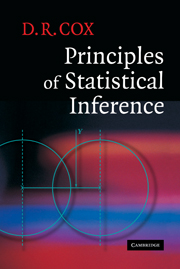Book contents
- Frontmatter
- Contents
- List of examples
- Preface
- 1 Preliminaries
- 2 Some concepts and simple applications
- 3 Significance tests
- 4 More complicated situations
- 5 Interpretations of uncertainty
- 6 Asymptotic theory
- 7 Further aspects of maximum likelihood
- 8 Additional objectives
- 9 Randomization-based analysis
- Appendix A A brief history
- Appendix B A personal view
- References
- Author index
- Subject index
5 - Interpretations of uncertainty
Published online by Cambridge University Press: 17 March 2011
- Frontmatter
- Contents
- List of examples
- Preface
- 1 Preliminaries
- 2 Some concepts and simple applications
- 3 Significance tests
- 4 More complicated situations
- 5 Interpretations of uncertainty
- 6 Asymptotic theory
- 7 Further aspects of maximum likelihood
- 8 Additional objectives
- 9 Randomization-based analysis
- Appendix A A brief history
- Appendix B A personal view
- References
- Author index
- Subject index
Summary
Summary. This chapter discusses the nature of probability as it is used to represent both variability and uncertainty in the various approaches to statistical inference. After some preliminary remarks, the way in which a frequency notion of probability can be used to assess uncertainty is reviewed. Then two contrasting notions of probability as representing degree of belief in an uncertain event or hypothesis are examined.
General remarks
We can now consider some issues involved in formulating and comparing the different approaches.
In some respects the Bayesian formulation is the simpler and in other respects the more difficult. Once a likelihood and a prior are specified to a reasonable approximation all problems are, in principle at least, straightforward. The resulting posterior distribution can be manipulated in accordance with the ordinary laws of probability. The difficulties centre on the concepts underlying the definition of the probabilities involved and then on the numerical specification of the prior to sufficient accuracy.
Sometimes, as in certain genetical problems, it is reasonable to think of θ as generated by a stochastic mechanism. There is no dispute that the Bayesian approach is at least part of a reasonable formulation and solution in such situations. In other cases to use the formulation in a literal way we have to regard probability as measuring uncertainty in a sense not necessarily directly linked to frequencies. We return to this issue later.
- Type
- Chapter
- Information
- Principles of Statistical Inference , pp. 64 - 95Publisher: Cambridge University PressPrint publication year: 2006

